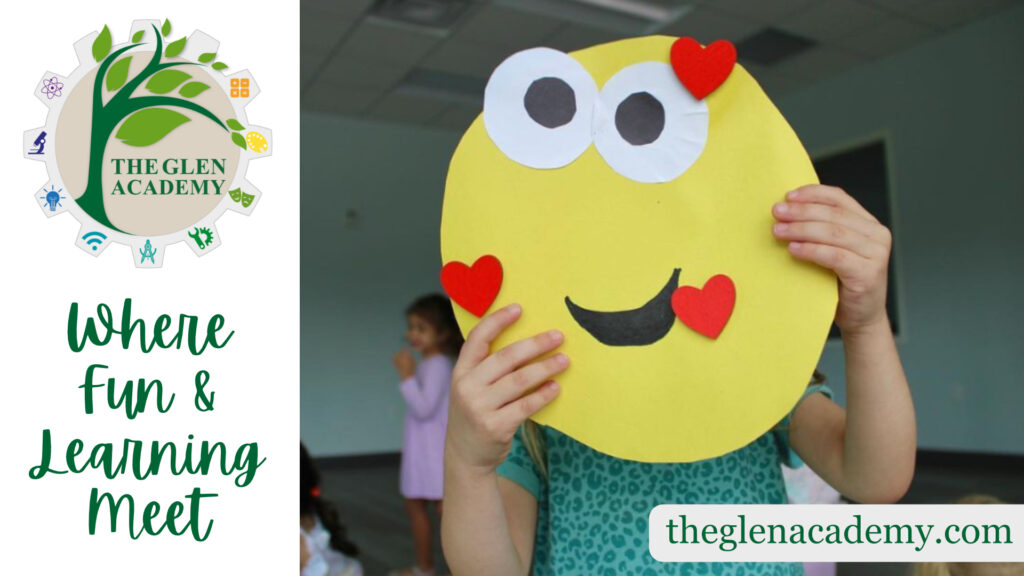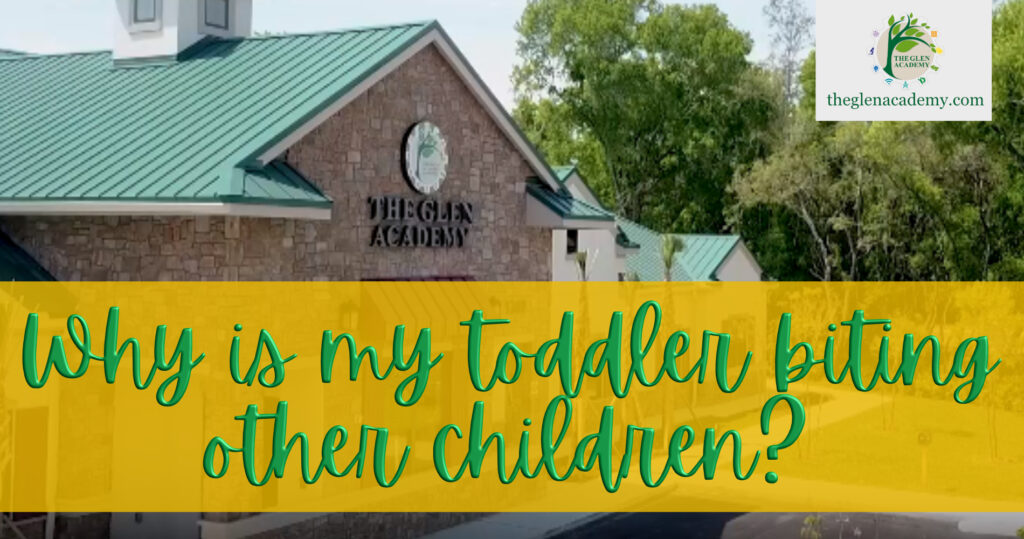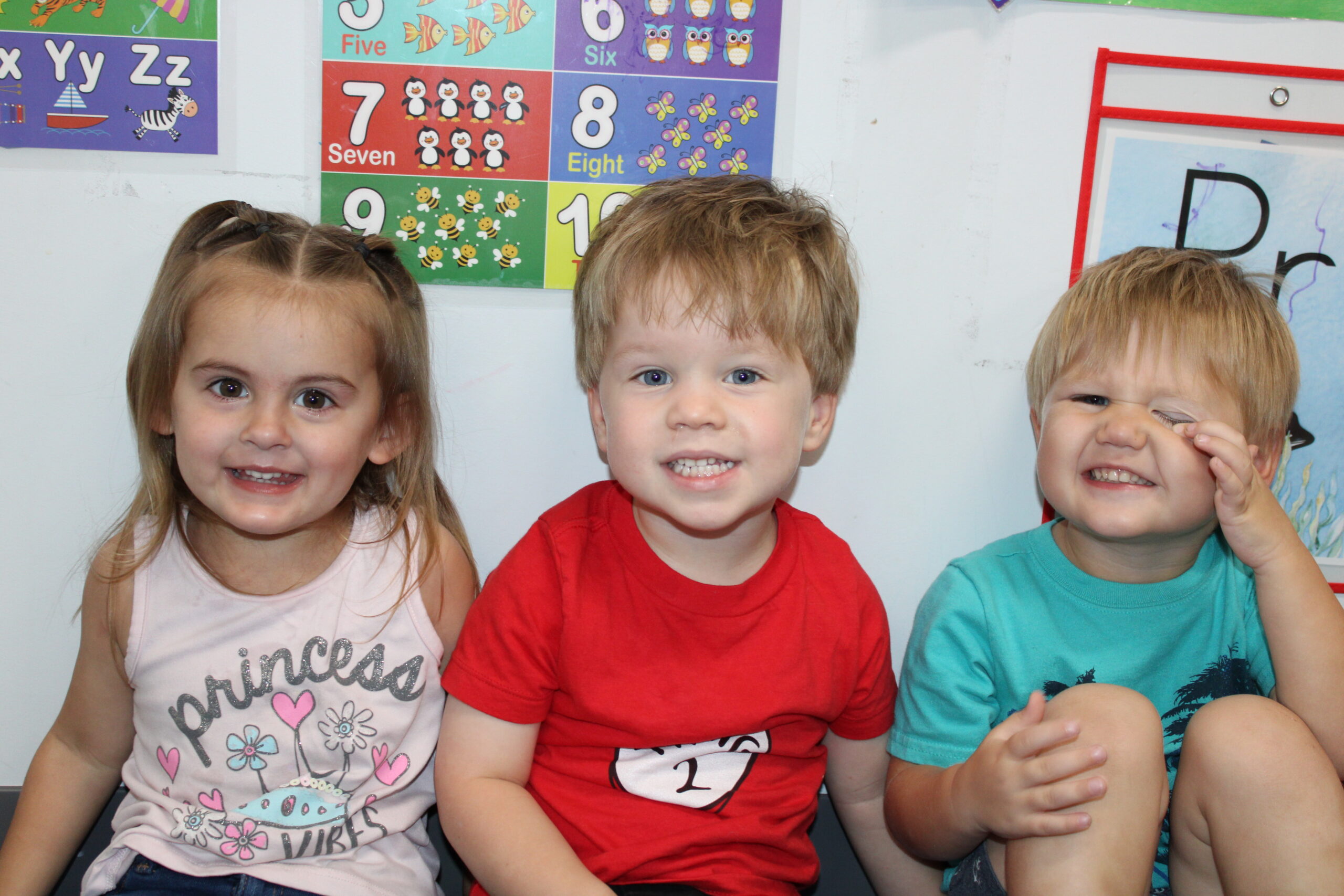
Why is my toddler biting other children?
Many parents would agree that toddlers do the most adorable things. From giving unexpected hugs, squealing with laughter, and cuddling up to you when they’re tired. A toddler is a joy for new parents and grandparents too.
But as we all might experience from time to time, a toddler will also do some not-so-adorable things, like kick, scream, and of course – bite. Did you know that biting is quite common in kids this age? It is ‘believe or not’ very common but it can still be rather frustrating and difficult to manage at times. Honestly, this blog article will cover a lot for the new parent, but first, let’s answer this question: why does biting begin to happen for toddlers in the first place?
Why is my toddler biting other children? – Thanks for reading this blog article written by The Glen Academy located in Casselberry Florida. This blog article will help new parents understand why biting happens and we are offering answers to the most frequently asked questions we get asked about. Enjoy!
Table of Contents
Why Do Toddlers Want To Bite?
As we just mentioned, biting is very common in early childhood. Toddlers bite for a variety of reasons, such as teething or exploring a new toy or object with their mouth. As they begin to understand cause and effect, they also might bite a person to see if they can get a reaction.
Biting can be a way for toddlers to get attention or express how they feel. Frustration, anger, and fear are strong emotions and toddlers lack the language skills to communicate how they are feeling. Instead, they may bite as a way of saying, “Pay attention to me!” or “I don’t like that!” Sometimes, toddlers may start biting so they can get access to a desired item, such as a toy.
To be honest, there are many reasons why toddlers might bite. The Glen Academy in Casselberry Florida has made a list below for quick reference purposes. If you think one of these reasons might be why your child is biting, please let us know the next time you bring your child in. We are on your side and we want to be helpful in ending the biting behavior with specific strategies based on what you might share with us. We understand that it is embarrassing for a new parent, but again we are right here with you.

Toddlers might bite if they:
- Have a Lack of Language Skills necessary to express their important needs or strong feelings like anger, frustration, joy, and so on. Remember that biting is a substitute for the messages he can’t yet express in words like ‘I am so mad at you’, ‘You are standing too close to me‘, ‘I am excited‘, or ‘I want to play with you’.
- Are feeling overwhelmed by the sounds, light, or activity level in this setting
- Are experimenting to see what will happen
- Need more active playtime to burn off energy
- Are over-tired and need a nap
- Are teething and need a teething toy
- Need oral stimulation such as a snack
Biting is slightly more common in boys and tends to happen most often between the first and second birthday. As language improves, biting tends to lessen.
Is biting normal for toddlers?
Be very aware that you can’t avoid the biting phase, but you can make it shorter and easier — on both you and your toddler.
First things first, as a parent try to figure out why it’s happening. Here are a few questions worth thinking about and discussing with your spouse/partner.
- Does the biting behavior happen mid-temper tantrum?
- Does your toddler always bite the same person?
- Is there a time of day when their biting behavior is at its worst?
- Does the behavior tend to happen in response to the same situation (like being excited)?
- How long has it been since your toddler ate a meal or did something physically active?
Why is my 3-year-old all of a sudden biting other children?
To be fair, these questions are trying to determine your child’s triggers. Understanding what may trigger your toddler will make it easier to predict — and prevent — future biting incidents. Here are a few useful tips, the Glen Academy feels are important to share with you, and remember your reaction to your toddler’s biting has a big impact. Here’s a quick list of common responses to avoid.
- Don’t label your child “a biter.” Here is a quick reminder to young parents, “it’s not out of the ordinary for children under age two to bite others. It doesn’t mean your child is bad — it just means they’re going through a phase.” Keep in mind that negative labeling can hurt your perception of your child, their self-confidence, their self-worth, and their self-perception. This can be very damaging mentally and emotionally in so many ways and we recommend never to label your child.
- Don’t yell at or shame your toddler. Yelling at or shaming your child for biting won’t make them stop, but it could make them more upset — and, in turn, more aggressive with others. A child reflects the actions and behaviors of their parents and/or guardians. A quick example would be – it is not uncommon to see a child want to hold a water cup or bottle if their parent is always holding a coffee cup in their hands. Keep in mind, that this is just simply one of many examples.
- Don’t punish a child for biting. It can be easy to lose sight of your patience! When you feel you are beginning to lose your patience in the moment, just stop and take a break. It is okay to calm down and begin again to try to teach your child discipline, social skills, and self-control. Keep in mind, that any form of punishment doesn’t do any of those things. It just adds more pressure and feelings into a mix that your toddler is already struggling to negotiate.
- Don’t bite your child back. Some people think biting a child back is instructive — that they need to be bitten to understand that it hurts. That’s incorrect. Biting your child is a form of abuse, just like hitting. It also communicates that violence is an acceptable way to respond to problems. Plus, it destroys a trusting bond between the toddler and a parent within the family unit too.
Is biting normal for a 3-year-old? What Do I Do When My Toddler Bites?
Many parents mention that their child never used to bite at all and only has started biting other kids since starting Preschool. Most parents, simply want to know how can they stop it. Believe it or not, we hear this when we mention that a biting incident happens during the day. First things first, keep your feelings in check as a parent. It is easy to play the blame game about the preschool or other toddlers in the classroom. Don’t do that.
When a toddler bites, you (a new parent) might feel frustrated, infuriated, annoyed, embarrassed, and/or worried. All of these feelings are normal. Trust us when we say responding when you are in an intense emotional state is usually not a good idea.
So calm yourself before you respond—count to 10, take a deep breath, or do whatever works for you. If you hear about it before getting your child at Glen Academy’s predetermined pickup schedule – take a moment to calm down and then get your child.
We are here to share ways of identifying the kinds of situations that often lead to biting will help you find the best way to prevent biting. Just ask one of our friendly staff members to give your advice. You are not alone and we are here to help you.
Things to do in a firm, matter-of-fact voice (but not angry or yelling), say:
- No biting. Biting hurts.
- Comment on how the other child is feeling: Look, at your friend is crying. They are (or were) crying because you bit them. Biting hurts.
- Keep it short, simple, and clear.

Try to shift your attention to the child who was bitten. Thanks for taking time to read ‘Why is my toddler biting other children?’ written by The Glen Academy.
Often when a child bites, adults pay a lot of attention to him or her. This is negative attention, but it is still very reinforcing and can cause more of the biting behavior to continue, rather than less. Some children are eager for any attention – negative or positive, so be mindful of this.
When parents shift their focus and energy to the child who was bitten, they communicate that biting does not result in more attention. Showing concern and sympathy for the child who was bitten also teaches empathy. Remember, learning a new behavior takes time. If you are getting your child, at the end of the day, keep in mind to speak with the classroom teacher to discuss how you can be aligned with the proper steps the teacher wants to reinforce.
If your child is verbal and able to talk about his experiences, go back and talk with him about the different strategies he can use next time, instead of biting:
- If a classmate grabs your toy and won’t let it go, you can say: “Use the classmate’s name, that is my toy. Please give it to me.”
- If the classmate won’t give it back, you can ask your teacher and they will help you.
- Or: When you want to play, you can say: “Will you play with me?” Then your friend knows you are ready to play.
If you find it happening at home, help the children move on. Ask: What would you like to play now? It might help to offer activities, like play-dough, drawing, or playing in sand or water, that allow them to release energy in constructive ways and can help them relax. The toddler who bit and the child who was hurt should not be made to play with one another, unless they want to.
Remember, learning a new behavior takes time. It helps to use the same words such as No biting. or Biting hurts. as consistently as possible to emphasize the message. Your toddler may bite again, so continue watching playtime closely when at home, or the playground, and we at The Glen Academy will do so as well. It also helps to use the same words (No biting. Biting hurts.) as consistently as possible to emphasize the message.
Toddlers who bite, what does it mean, and when to worry.
While biting is a very common behavior, it usually stops by age three to three and a half years old. If your toddler continues to bite, or the number of bites increases instead of decreases over time, it is probably a good idea to request an assessment from a child development specialist. The Glen Academy team is ready to speak with you and make certain you get in contact with the right person. Don’t hesitate to ask us if you need our assistance anytime you are delivering or picking up your child.
We recommend this professional because they can help you identify the reason for the biting and develop a strategy for addressing the behavior. Remember, there is no quick fix. Over time, and with assistance, your child will stop biting and use more appropriate ways to express his or her needs.
Again – What absolutely WILL NOT work to stop biting?
The professional staff at the The Glen Academy in Casselberry FL want to reinforce what will not work with correcting this behavior.
- Shaming or harsh punishment do not reduce toddler biting, but they do increase your child’s fear and worry—which can increase biting incidents. Aggressive responses like these also do not teach your child the social skills he or she needs to cope with the situations that trigger biting.
- Biting your child back, which some might suggest, is not a useful response. There is no scientific research to show this behavior reduces biting. However, it does teach your child that it’s okay to bite people when you are upset! Keep in mind that human bites can be dangerous, and biting constitutes child abuse. This is not an appropriate response to toddler biting.
Why is my toddler biting other children? – Thanks for reading this blog article written by The Glen Academy!
The Glen Academy wrote this article to help you better understand ‘Why is my toddler biting other children?‘
If you still have questions, feel free to call us and ask our caring staff members who are caring for your child. Follow us on Instagram, Google Profile, and Facebook now! Remember we love caring for your child no matter what stage of early childhood he or she is in. Again, thanks for reading this blog article.
